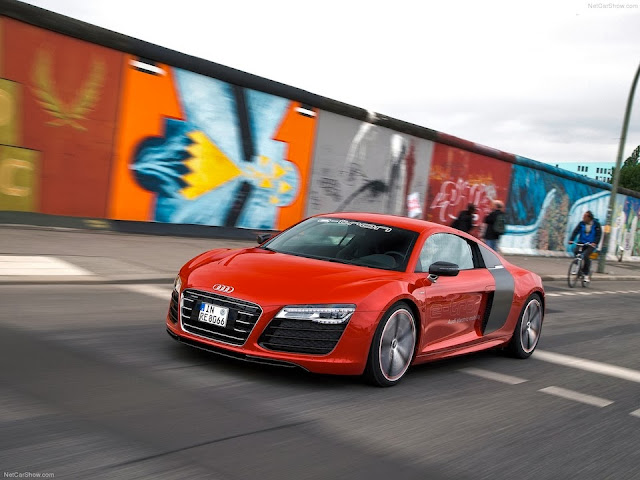The results are already available in showrooms. The hybrid Toyota Prius has taken the world – particularly diesel hating America – by storm, while Nissan has shown with the LEAF that battery power can be a viable alternative to a petrol motor, albeit only if you use your car on shorter urban trips.
Trouble is, as clean, high-tech and economical as these initial forays into sustainable mobility have been, they don’t exactly get the pulse racing; majoring on eco-friendliness rather than style and performance. But ardent petrol heads needn’t despair, as carmakers are also harnessing the potential of alternative energy sources to create a new breed of exciting cars, from stylish coupes, to all out supercars.
Here are our top five cool green cars: Audi R8 e-tron
It looks almost identical to the regular V8 petrol powered version, yet the battery powered Audi R8 e-tron will comfortably out-accelerate it in the benchmark 0-62mph sprint, and all without emitting a single gram of CO2, thanks to twin electric motors developing the equivalent of 380bhp and a crushing 820Nm of torque, all of which is available from tickover. A production version was put on ice thanks to the astronomical costs of the extensive weight saving measures needed to make it so quick, but the electric technology is already filtering down into cars that will soon be available in showrooms, including the plug-in hybrid Audi A3 e-tron. BMW i8 First unveiled in 2009, the BMW i8 is the flagship model in the German marque’s new ‘i’ range of hybrid and electric vehicles. Since that initial concept, the final production version was revealed at this year’s Frankfurt motor show, and thankfully had lost none of its futuristic design. Combining a relatively small 1.5-litre three-cylinder engine with an electric motor means the svelte i8 can hit 0-62mph in just 4.4 seconds, and will keep on accelerating to 155mph. Despite this impressive turn of speed, it will return a combined 113 mpg and emit just 25g/km CO2, largely thanks to its ability to run up to 22 miles – at speeds of up to 75 mph – on electricity alone. SLS Electric Drive Not ones to be left behind in the alternative energy supercar arms race, Mercedes Benz turned to in-house tuners AMG and its simply gorgeous SLS supercar. Normally powered by an enormous 6.2-litre V8 petrol engine, the SLS Electric Drive sees that motor removed and replaced with four electric motors and some 548 kg of battery packs. While this makes the Electric Drive somewhat heavier than its combustion engine cousin, it isn’t left trailing in the performance stakes. Hitting 62 mph from a standstill in just 3.9 seconds and hitting a limited top speed of 155mph, the SLS electric drive is currently the fastest electric car in the world. Koenigsegg Agera R An altogether different proposition from Swedish manufacturer Koenigsegg, which rose to prominence offering insanely powerful hypercars such as the CCR. Their latest creation, the Agera R, is no different, serving up a Bugatti Veyron Supersport-scaring 1100bhp. However, it achieves that figure through the use of bio-ethanol, an alternative fuel source, which is created from crops, making it relatively sustainable. It can be used in regular combustion engines given a little amount of modification and in the Koenigsegg, means the car will hit 62mph in a scarcely believable 2.9 seconds. Tesla Model S Tesla first broke onto the scene with their diminutive Roadster, which was essentially a battery powered Lotus Elise. It showed the world that electric cars could be fast, and now the company’s founder, billionaire Elon Musk, is using the brand new Model S to fulfil his ambition to show the world that electric cars can be just as good as those powered by petrol. It uses a pure electric drivetrain, with the batteries holding enough juice for a range of 265miles and a 0-62mph time of 4.4 seconds – though probably not at the same time. It’s a serious proposition from a company determined to make its mark on the future of motoring, though we can’t help think that the designers could have been more adventurous. It hasn’t seemed to put off buyers, though, with Tesla having already taken over 10,000 deposits from buyers attracted by the car’s blend of performance and luxury.





.jpg)



No comments:
Post a Comment